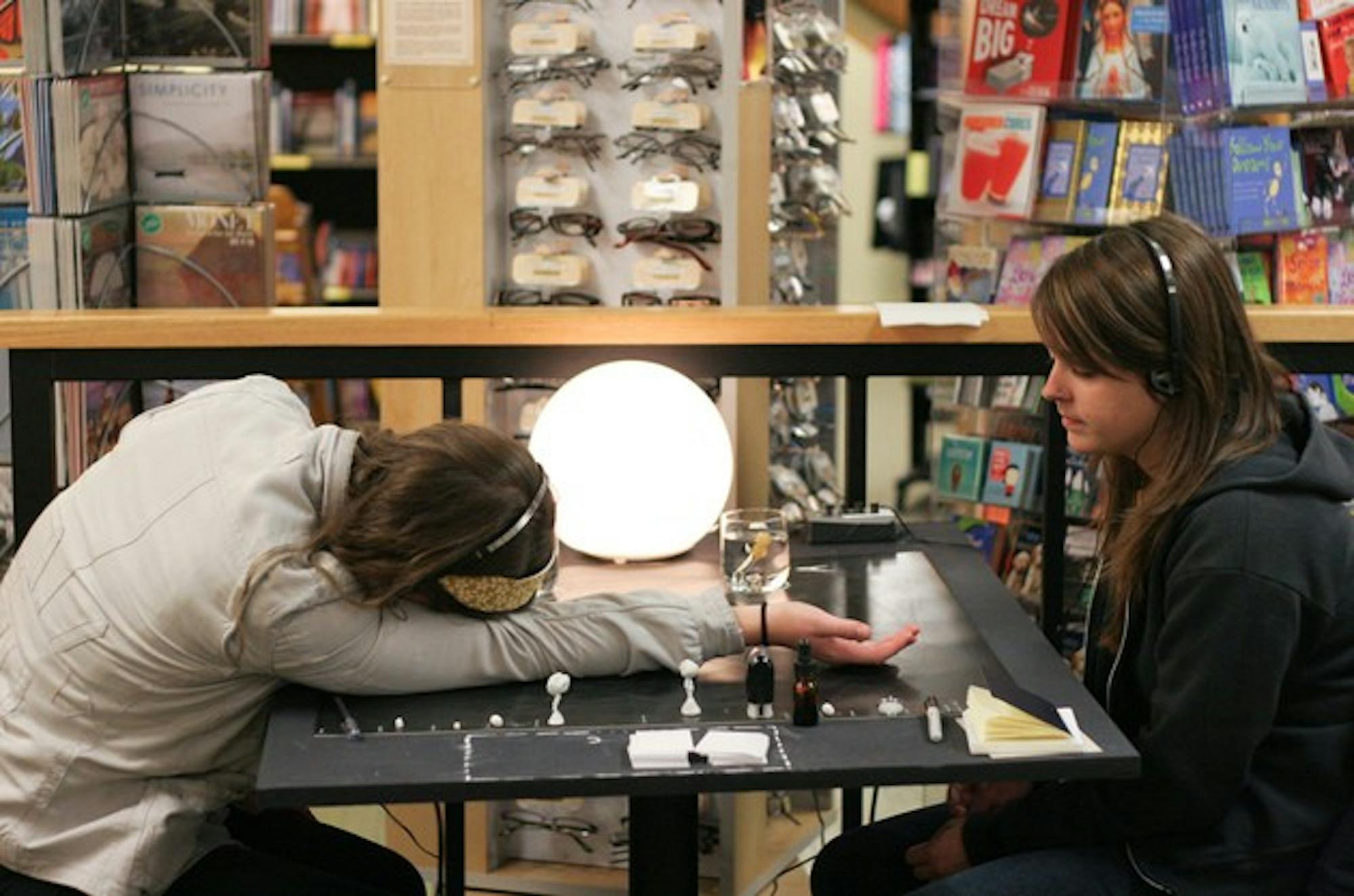You may recognize their faces through the window, but these students have stepped out of their roles as students to participate as actors in "Etiquette," an innovative interactive theater piece by the London-based group Rotozaza that blurs the lines between performing, acting and observing.
Each participant in the performance wears a set of headphones that supplies verbal prompts for conversation and interactions. Through the dialogue and actions a story line unfolds.
The narrative of "Etiquette" borrows themes and some dialogue from film and theater, but at the work's heart is mystery, suspense and intrigue.
Participants (who the show refers to as "stars") may play the "part" of an intellectual older man or a mystifying young female stranger using only such minimal props as a flashlight, food coloring, water, an eye dropper and putty.
The members of Rotozaza, Silvia Mercuriali, 30, and Anthony ("Ant") Hampton, 32, have been itching to make "Etiquette" a reality for at least six years.
Mercuriali and Hampton first met at a theater workshop in Paris. After getting to know each other better, they decided to form their group Rotozaza, creating at least 10 different plays before putting the final touches on "Etiquette." As they slowly perfected their TOCAR style -- Theater of Command and Response -- critics in British and U.S. theater circles began to notice their groundbreaking work, and Rotozaza suddenly became an underground hit.
Over the course of a series of productions that implement Rotozaza's characteristic TOCAR style, the group has perfected the precise technique and timing that make "Etiquette" such an engrossing piece.
Mercuriali and Hampton first conceived of TOCAR when they were trying to create a play to help their non-actor friend overcome his stage fright.
"Our first TOCAR play, 'Bloke,' was designed to frame the participant as an individual and celebrate the different ways he responded to the prompts handed to him by a recording," said Mercuriali during a workshop held in Collis Commonground on Sunday.
Soon, Rotozaza moved on to different plays that experimented with the ideas of "equalizing" the playing field between actors and spectators.
In one production, the artists switched from playing a recording out loud for the audience to giving the actors headphones so that the audience could not hear.
Hampton described this as a shift from "sharing" the performance with the audience to "concealing" the performance from the audience.
Rotozaza's performances explore the theme of the "split self" and "multiple personalities."
To do so, Mercuriali and Hampton began to pair people in performances, having them play off each other to make their individual performances fuse and complement one another.
As the team explained in the workshop on Sunday an example of this occurs in their play "Grace," in which a director and an character give each other orders and respond.
The two characters eventually end up in a charged argument where their individual traits disappear and switch so that they become a single character.
"Our plays usually explore the idea that there is always one person inside us telling the other person what to say or do. The other person may sometimes do these things, but usually there is a conflict," Hampton said.
The themes of "split self" and "equalizing" actors and audiences are both apparent in "Etiquette," which explores the relationship that two people can form when placed in an unfamiliar, uncontrollable situation.
"'Etiquette' is very much about relinquishing responsibility, while still retaining a sense of freedom while constrained," Mercuriali said.
After participating in "Etiquette," as well as another TOCAR play, entitled "Rom Com," during the Sunday workshop, I can attest to how it feels to relinquish control. By becoming an actor in a completely constructed and framed environment, you easily enter the world of the character you inhabit.
Although there are some minor glitches in "Etiquette," such as the possibility of snubbing lines and misunderstanding the prompts for dialogue and actions, Rotozaza intends the piece to confuse its participants.
When these mistakes occur, they force the participant to realize that any performance is threatened by accidents and interruptions, and that even everyday conversations lead to unexpected consequences.
"Etiquette" slowly creates an alternate reality in which each participant is a spectator, an actor and, most importantly, a performer.
"Etiquette" began its run at the Dartmouth Bookstore on Saturday Nov. 8th and will continue with performances on the half-hour through Sunday, Nov. 16th. A complete schedule is available at the Hopkins Center for the Arts' web site.




![HONEYJOON_[Ines Gowland]_4.PNG](https://snworksceo.imgix.net/drt/7af2efc8-1bd1-4001-b754-e2718ce663b8.sized-1000x1000.PNG?w=1500&ar=16%3A9&fit=crop&crop=faces&facepad=3&auto=format)